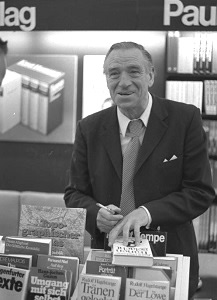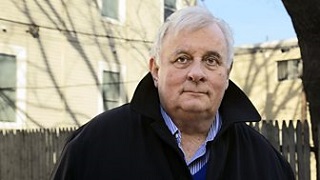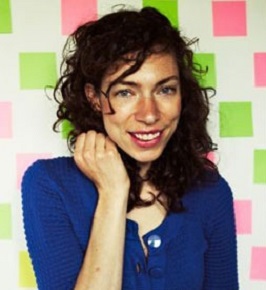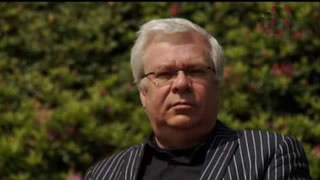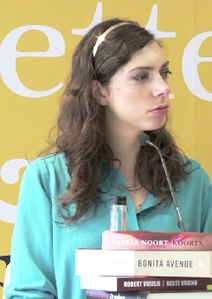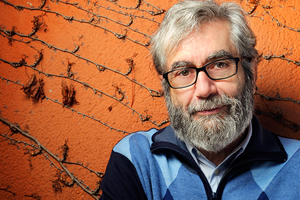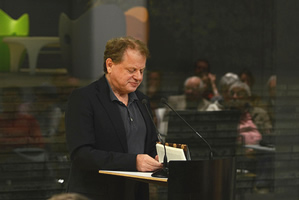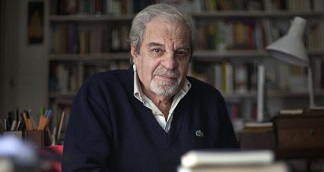De Amerikaanse schrijver, sportjournalist en oorlogscorrespondent W. C. Heinz werd geboren op 11 januari 1915 in Mount Vernon, New York. Na zijn afstuderen aan het Middlebury College in 1937 trad hij toe tot de redactie van de New York Sun. Na voor de krant gewerkt te hebben als oorlogscorrespondent in Europa tijdens WO II keerde Heinz terug naar de VS en kreeg zijn eigen sportcolumn genaamd “De Sport Scene”. Een van zijn stukken van rond deze tijd – Death of a Racehorse, geschreven in 1949 – werd beroemd om zijn beknoptheid (minder dan 1.000 woorden) en de kwaliteit ervan, en werd vegeleken met de Gettysburg Address en de werken van Ernest Hemingway. Toen The Sun ophield te verschijnen werd Heinz in 1950 freelance schrijver. Hij leverde regelmatig bijdragen aan tijdschriften zoals SPORT magazine, Life, The Saturday Evening Post, Esquire, True, Collier’s, en Look. De beste stukken zijn gepubliceerd “American Mirror”, “What A Time It Was: The Best of W.C. Heinz on Sports” en “The Top of His Game: The Best Sportswriting of W. C. Heinz. Hij publiceerde zijn eerste boek, een roman genaamd “The Professional” in 1958. Ernest Hemingway noemde het boek “the only good novel I’ve ever read about a fighter, and an excellent novel in its own right.” Andere boeken van Heinz zijn: “Run to Daylight”, “The Surgeon”, “Emergency” en “Once They Heard the Cheers”. In de late jaren 1960 werkte Heinz (onder het pseudoniem Richard Hooker) samen met Dr. H. Richard Hornberger aan de roman “MASH”. Het boek was de voorloper van de film MASH, die de prijs voor beste film van het Cannes Film Festival won in 1970 en een Academy Award voor beste scenario op basis van een ander medium in 1971. Het boek diende ook als uitgangspunt voor de lang lopende tv-serie. Heinz ontving veel onderscheidingen en prijzen, waaronder vijf keer de E. P. Dutton Award voor beste tijdschriftverhaal van het jaar.
Uit: Death of a Racehorse
„They were going to the post for the sixth race at Jamaica, two year olds, some making their first starts, to go five and a half furlongs for a purse of four thousand dollars. They were moving slowly down the backstretch toward the gate, some of them cantering, others walking, and in the press box they had stopped their working or their kidding to watch, most of them interested in one horse.
“Air Lift,” Jim Roach said. “Full brother of Assault.”
Assault, who won the triple crown … making this one too, by Bold Venture, himself a Derby winner, out of Igual, herself by the great Equipoise … Great names in the breeding line … and now the little guy making his first start, perhaps the start of another great career.
They were off well, although Air Lift was fifth. They were moving toward the first turn, and now Air Lift was fourth. They were going into the turn, and now Air Lift was starting to go, third perhaps, when suddenly he slowed, a horse stopping, and below in the stands you could hear a sudden cry, as the rest left him, still trying to run but limping, his jockey — Dave Gorman — half falling, half sliding off.
“He broke a leg!” somebody, holding binoculars to his eyes, shouted in the press box. “He broke a leg!”
Down below they were roaring for the rest, coming down the stretch now , but in the infield men were running toward the turn, running toward the colt and the boy standing beside him, alone. There was a station wagon moving around the track toward them, and then, in a moment, the big green van that they call the horse ambulance.
“Gorman was crying like a baby,” one of them, coming out of the jockey room, said. “He said he must have stepped in a hole, but you should have seen him crying.”
“It’s his left front ankle,” Dr. J.G. Catlett, the veterinarian, was saying. “It’s a compound fracture; and I’m waiting for confirmation from Mr. Hirsch to destroy him.”
He was standing outside one of the stables beyond the backstretch, and he had just put in a call to Kentucky where Max Hirsch, the trainer, and Robert Kleber, the owner, are attending the yearling sales.”
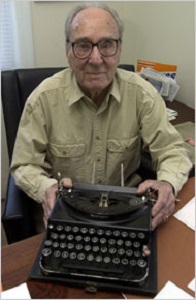
W. C. Heinz (11 januari 1915 – 27 februari 2008)
